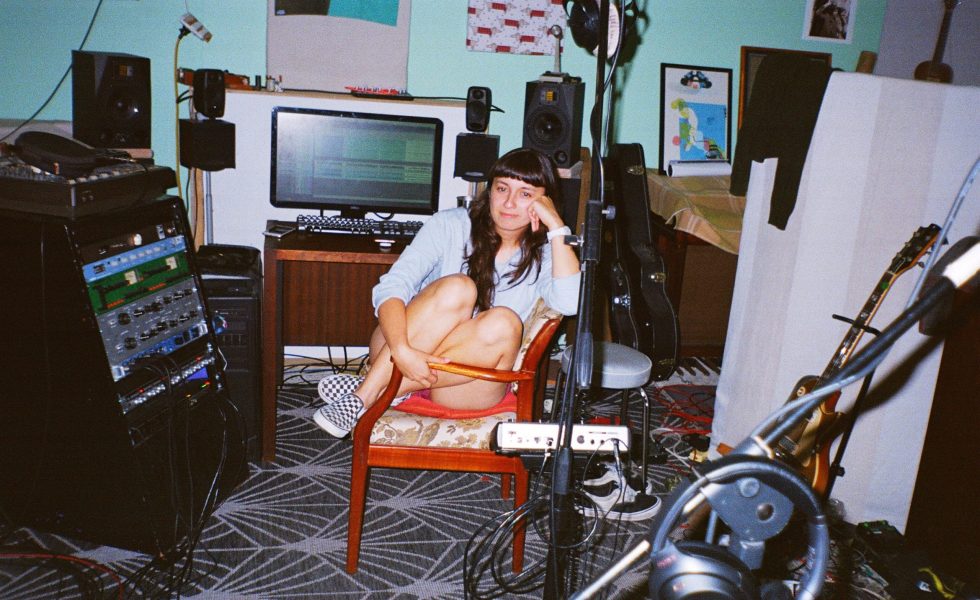When I worked on BLUNT in its previous incarnation (before it was buried unceremoniously by its parent company, left to rot in the void until Mike and Peyton swooped in and revived it from the dead like punk-rock Frankensteins), my go-to breakfast was a double-serve can of V Energy – the all-elusive flavour known only as ‘Blue’, of course – and two original glazed Krispy Kreme doughnuts from the nearest 7-Eleven. Not the healthiest of choices, I’m well aware, but the office was a 90-minute drive from where I lived, and I could barely conjure up the energy to shower and get dressed in time, let alone even think about proper nutrition.
Naturally, workday mornings were defined by a reckless cocktail of adrenaline and anxiety, the caffeine and refined sugar surging through my veins to the beat of a shitty off-tempo breakdown courtesy of whatever local metalcore band had emailed us the night before. My GP didn’t, but I liked the rhythm I was in – I could churn out news pieces at a rate of three per hour, and had a feature or two scribbled up by lunch. I was a fucking wreck, sure, but I was an unstoppable one.
That was four years ago, but I’m reminded of The Classic BLUNT Grind every time I hit play on Future Me Hates Me, the 2018 debut album from Auckland-native pop-rockers The Beths. It’s a chaotic record, to say the very least, defined by its breakneck pacing, off-the-wall energy and loveably self-deprecating revelry – a reckless cocktail of adrenaline and anxiety.
Nowadays I work from home, and my morning routine is much more respectable: I lie in bed for a while and scroll through news articles, eat Weet-Bix with fresh fruit, and make a concerted effort to spend some time outside before I whip open my laptop. It’s a chilled-out life; I can breathe.
Incidentally, that same relaxed maturity is how The Beths approached their second album, Jump Rope Gazers (which dropped last week via Dew Process). Track three on Future Me Hates Me is “Uptown Girl”, a manic, blink-and-miss-it punk-pop scorcher in which frontwoman Liz Stokes declares she’s going to “drink the whole town dry”. At the same point on Jump Rope Gazers (its eponymous simmering, five-minute-plus ballad), she’s crooning earnestly about how she thinks she loves its protagonist, and thinks she’s loved them “the whole time”.
“Sometimes I wonder if I’m getting sadder,” Stokes ruminates to us from her living room. “I don’t know, I used to think of myself as funny, but I don’t think I’m that funny anymore… Oh God, what’s happening to me!?”
It’s always a good sign when an interview kicks off triggering an existential crisis, right?
“I think I just see more value in earnestness and sincerity now,” she concludes after some brief self-reckoning. “I don’t think that means that I think humour isn’t important, because I still love that – particularly in music, I love when there’s humour in the lyrics and the way the music is made – but I feel like I’m becoming a little more straight-laced of late, and maybe it’s just that shining through… And I’m okay with that, I think.”
Its title track was the first demo Stokes finished for Jump Rope Gazers, and was integral in her committing to a second LP at all. It was chosen to represent the release as a whole because of the leap of faith it represented for Stokes as a songwriter, stepping out from her comfort zone of penning quirky, tongue-in-cheek pop hooks and tackling a sincere love song head-on.
“There’s barely any gags on it,” she quips, surprised by her own restraint. “It was a scary one to write. As a songwriter, I tend to hide a little bit behind jokes, or metaphorical terms of phrase and things like that – which I still like, and I stand by that formula – but this was just a plain, clear-cut love song, and you can’t hide behind anything with that! But when I was sharing it with the band, I knew there was something special in it.”
Even once the song was immortalised on tape, Stokes couldn’t escape it; “It was always at the top of my mind when we were making the rest of the album,” she concedes, noting that, “Even though all the songs are about different things, they all tended to be about relationships – whether they’re romantic relationships or relationships with family and friends and stuff like that.”
“As a songwriter, I tend to hide a little bit behind jokes, or metaphorical terms of phrase and things like that”
Such came to shape the way Jump Rope Gazers would unfurl positively in contrast to Future Me Hates Me. Where LP1 mostly saw Stokes punching down on herself and using irony as a shield on its few love songs, the follow-up allowed her to embrace the comfort and positivity at the core of her relationships.
As for what it actually means to be a ‘jump rope gazer’, Stokes is less than willing to break down the mystery. When it comes up in our Zoom meeting, she flips the script and asks what I think it means. I stutter – having put absolutely no thought into it prior, mind – through a half-baked theory that it’s a metaphor for the fantasticality of young love, and how the butterflies you feel in your stomach over first crushes rarely make sense, but consume your entire being nonetheless. I’m not exactly right, Stokes admits, but she commends the sentiment; she likes the dorky, lackadaisical whimsicality it inspires.
“Here’s the thing,” she clarifies: “I wrote [“Jump Rope Gazers”] with quite a specific kind of metaphor in mind, but knowing that it doesn’t have to have a predetermined meaning. I’m hesitant to explain what my version of it is, because I don’t want to ruin the mystery. Whenever I talk to someone about the song and ask what they think it means, they all have a different interpretation, and I really like that. I don’t want to squash their creativity by going, ‘Well, this is what it actually means.’ It’s about people being connected, and it’s linked to a particular experience of mine, where… It feels so dumb to say it, but there is an actual skipping rope involved. But I like leaving some secrecy around that and leaving it open to interpretation – to be honest, people usually think of something better than what I thought of when I came up with it.”
We liken the idea of Stokes hinting at there being an actual skipping rope, but not giving any more context, to those Tupperware containers with food-themed designs on them. “You give people an empty container with some colour [being the song itself], but they can fill it with their own choice of protein [being the meaning behind it].”
This is more or less how Stokes operates as a songwriter to begin with – she’s not one for crafting huge, sprawling narratives for her themes to embrace, or building intricate worlds for her subjects to flourish in – rest assured The Beths present Aotearoan Idiot won’t be on the cards anytime soon, whether or not their now-on-ice Australian tour with Green Day ends up going down.
“I think primarily, from a songwriting perspective,” she explains, “I’m just going with the flow. I write when I have the energy to write, or when I feel like I want to write about something. And I’m drawing from immediate experiences – either mine or from people around me, or people that I’m seeing and things like that.”
There was no particular moment or impetus that set Jump Rope Gazers in motion – hell, it wasn’t even until Stokes had written more songs than there is on the album that she realised one was even forming under her fingers. But what The Beths were certain on from day one was that whenever LP2 would eventually materialise, they would make it on their own terms. They were staunch on replicating the setup they used to make Future Me Hates Me, recording close to home in Auckland with lead guitarist Jon Pearce producing, engineering and mixing the whole shebang.
The band’s team was obviously onboard with their plans, but Stokes is quick to note that such wasn’t a given off the bat.
“When you put a record out and it does well, the world kind of seems like it’s opening up in some ways,” she says. “All of a sudden, you’re like, ‘Well, we could make this one more professionally – we could fly overseas and make it with a bunch of famous people and do it all very differently.’ But I think it was important to us to keep certain core things the same so that if we stretched out more in style or with our songwriting, we would still feel like the same band.”
“I think it’s really important to be talking about where we’re trying to go with our individual parts, and where we want to take the arrangement”
Despite mimicking its recording process, Jump Rope Gazers couldn’t sound any less like its predecessor. Where the bulk of Future Me Hates Me feels audaciously bombastic, a little low-fi and structurally unhinged (not to its detriment, of course – those are all songs for which an organic, punk-channelling sound is designed to shine brightest), Jump Rope Gazers is decidedly tighter and more sharply produced. Pearce chalks it down to bettering his skills behind the console, becoming more familiar with his role as an engineer in the intervening years between releases.
“We were a little more able to accomplish the kind of balance we wanted,” he says. “We’re still an indie band and we still wanted our music to sound quite organic, but we also wanted it to sound really tight. Our hope is that we can sound like a real band, but you can put our record on next to almost any other major label record and it’ll sound fine; you won’t think to yourself, ‘Oh, that’s a bit lo-fi,’ or, ‘That’s a bit amateur.’”
Ironically, while it sounds infinitely tighter than their earlier works, the band saw Jump Rope Gazers as an opportunity to experiment more closely with the art of tracking live to tape (a technique markedly more risky than recording each part individually, which Pearce could then tinker with meticulously). When they made Future Me Hates Me, for example, bassist Ben Sinclair would re-record his parts up to three times, resulting in melodies completely divorced from their original demos. But for Jump Rope Gazers, the band tracked two guitars, drums and bass live as the core for every song.
“We were in the same studio space where we recorded Future Me Hates Me, but we knocked a couple of the walls down,” Pearce says. “So instead of little cubicle-sized offices, it’s just one room that’s large enough for the four of us to set up comfortably in. And it’s really nice! I think that had a huge influence on the record; it meant I was in the same room as everyone else while we were recording, so there was no kind of ‘recording-engineer-slash-band’ communication barrier.”
Recording as a full band – and being able to communicate freely between takes – allowed The Beths to capitalise on their inimitable chemistry as a unit. If you’ve ever had the privilege of seeing them live, you’ll know what I’m talking about: it’s the witty banter they bounce back and forth like it’s part of a well-oiled stand-up routine, the improvised guitar solos and drum fills that feel impossibly natural, and the harmonic interplay between each other’s parts that make every last hook earwormish as hell.
At the end of the day, The Beths are just four best mates (and a couple, via Stokes and Pearce) who all happen to be inhumanly talented at writing fist-pumpable power-pop bangers. When you strip it down to brass tacks, their dynamic of being friends first and bandmates second is a critical aspect of what makes their records click.
“We love hanging out so much that when we have a band practice, we spend the first, like, 70 minutes or so just chatting,” Pearce says. “I think it sets us up so that we’re all playing together, we can chat through what we’re finding difficult about a part, what we’re enjoying about it, and what ideas we might have to change things up. And when we’re writing, I think it’s really important to be talking about where we’re trying to go with our individual parts, and where we want to take the arrangement – and we can reinforce each other’s ideas that way, too.”
“You hope that people like the second record, but there’s no guarantee that the people who listened to the first one will even bother with it”
Of course, all four of the respective Beths are fantastic musicians of their own accords, each with emphatically unique skillsets that gel when the band convenes. Pearce opines; “I think we have just enough on the fringes of our collective venn diagram of musical tastes and ambitions that we can pull each other in interesting directions and come up with slightly unpredictable answers to things like arrangements and performing.”
One notable example comes at the hands of drummer Tristan Deck (pun intended), who, as a member of the collective GRG67, won the 2019 New Zealand Music Award for Best Jazz Composition. Deck’s skills as an improvisational drummer are simply second-to-none; you could literally come up with a melody on the spot, and before the fourth bar hits, he’ll have the perfect beat to pull it off laid down.
“We all like to improvise parts where we can,” Pearce points out, “But Tristan goes above and beyond with it. He brings a little bit of that jazzy spirit to the band, where I don’t think he feels any pressure to play something perfectly until he’s really developed the idea. And that’s contrary to how I work, for instance – when I’m developing an ideas, I’m usually very focussed on making it confidently sing out, even though it might not be the final version of what that idea will turn into. Tristan loosens me up a bit in that respect; I think I can get a bit hung up on nailing things when I should really just be exploring more.”
The topic of improv circles us back to an earlier thread from this story, with Jump Rope Gazers being The Beths’ most stylistically daring effort yet – from the cruisy, slow-burning canter of its title track and the emotionally charged “Do You Want Me Now?”, to the ultra-crunchy guitar solo on “Out Of Sight”, the soaring harmonies and flecks of synth on “Just Shy Of Sure”, and the inescapable (and unexpectedly Weezer-esque) catchiness of “Don’t Go Away”.
It’s certainly a multicoloured affair – which makes it understandable that Stokes was, at one point, a tad uneasy about unleashing it into the wild.
“I had some ‘sophomore album anxiety’ towards the end of the process,” she confesses. “Y’know, you hope that people like the second record, but there’s no guarantee that the people who listened to the first one will even bother with it. But I think the thing we have to tell ourselves is that the stress and anxiety you feel about it doesn’t necessarily make the record better – the only thing you can really do is try to make a good record. You have to remember why you’re doing it and what you want to get out of it in the first place, and if you make something that you are proud of and can stand by, then that’s good enough.”
Good thing, then, that Jump Rope Gazers is far, far more than ‘good enough’.










